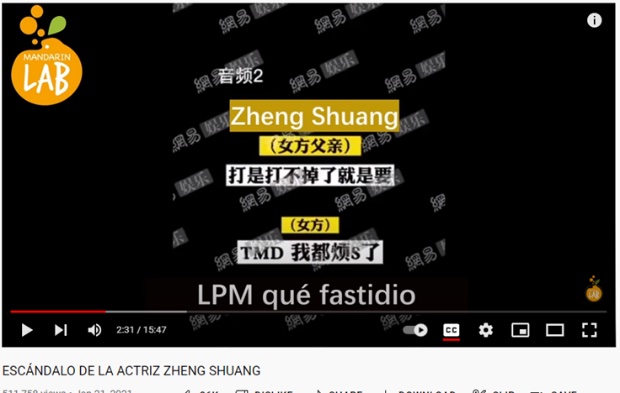Archive for June, 2022
June 27, 2022 @ 9:48 pm· Filed by Victor Mair under Etymology, Language and culture, Language and food, Usage
Chopsticks: in cookery, designates:
a pair of thin sticks, of ivory, wood, etc, used as eating utensils by the Chinese, Japanese, and other people of East Asia
[C17: from pidgin English, from chop quick, of Chinese dialect origin + stick1]
Collins English Dictionary – Complete and Unabridged, 12th Edition 2014
That's for the English word, now for the Chinese:
The Old Chinese words for "chopsticks" were zhù 箸 (OC *das) and jiā 梜 (OC *keːb). Zhù 箸 is preserved in almost all Min dialects (Taiwanese tī, tū; Fuzhou dê̤ṳ) and some other dialects, especially those in some contact with Min; it is also preserved in loans to other languages, e.g., Korean 젓가락 (jeotgarak), Vietnamese đũa and Zhuang dawh. Starting from the Ming Dynasty, the change to kuàizi 筷子 occurred in Mandarin, Wu, and some Cantonese dialects. The 15th century book Shuyuan Miscellanies (《菽園雜記》) by Lu Rong (陸容) mentioned this change:
-
-
- As the mariners feared 住 (“to stay”) […], they called zhù 箸 (“chopsticks”) kuàier 快兒 (lit. "quick + diminutive suffix"). [VHM: alt. "As the mariners had a taboo against "lingering / staying", they called zhù 箸 (“chopsticks”) kuàier 快兒 (lit. "quick + diminutive suffix").
The bamboo radical (zhu [the sound is not relevant here 竹) was later added to kuài 快 to form kuài 筷.
(source, with some additions by VHM)
Read the rest of this entry »
Permalink
June 27, 2022 @ 2:05 pm· Filed by Victor Mair under Accents, Dialects, Historical linguistics, Phonetics and phonology
Chris Button writes:
I’ve been working on adding Japanese readings to my dictionary*. I decided to add pitch accents on the kun readings, and started getting interested in the history there. I came across some amazing work by Bob Ramsey—notably this one**.
[*VHM: Comparative historical dictionary of Sinitic and Indo-European.]
[**"The Old Kyoto Dialect and the Historical Development of Japanese Accent", Harvard Journal of Asiatic Studies, 39.1 (June, 1979), 157-175.]
Clearly, to my novice eyes, he is absolutely correct. I’m staggered no-one really accepted it! I suppose it’s that age-old issue with academia around it being very difficult to disrupt the old guard with their vested interests. In any case, it looks like
this recent article adds some nice typological data to Bob’s brilliant proposal.
I wonder what Bob thinks of it nowadays?
Read the rest of this entry »
Permalink
June 25, 2022 @ 5:22 pm· Filed by Victor Mair under Language and biology, Names
If you stroll through the grounds of the Morris Arboretum of the University of Pennsylvania, you may come upon this phenomenal tree:

Read the rest of this entry »
Permalink
June 25, 2022 @ 5:18 pm· Filed by Victor Mair under Orthography, Puns, Signs, Translation
Xiaowan Cai received this picture from a friend of hers who is on exchange from Oxford University at Kyoto University. Everything in all four languages on the sign looks pretty normal, except that there is a not easily detectable, extraordinary gaffe — or ingenious tour de force — in the Chinese.

Read the rest of this entry »
Permalink
June 25, 2022 @ 4:58 pm· Filed by Victor Mair under Acronyms, Code switching, Mixed lanuage, Multilingualism, Slang, Writing
[This is a guest post by Conal Boyce]
A tale of five mothers, two of whom got rich, one of whom became infamous,
and two of whom were to meet each other later in the bilingual alphabet soup shown below.
(Suitable for playing "This little piggy went to market, and this little piggy…"?)

Read the rest of this entry »
Permalink
June 25, 2022 @ 7:50 am· Filed by Mark Liberman under Computational linguistics, Humor
In a recent presentation, I noted that generic statements can be misleading, though it's not easy to avoid the problem:
The limitations and complexities of ordinary language in this area pose difficult problems for scientists, journalists, teachers, and everyone else.
But the problems are especially hard to avoid for AI researchers aiming to turn large text collections into an understanding of the world that the texts discuss.
And to illustrate the point, I used a couple of conversations with GPT-3.
Read the rest of this entry »
Permalink
June 24, 2022 @ 7:37 pm· Filed by Victor Mair under Borrowing, Etymology, Language and geography, Language and history
Every five years or so, popular science magazines have a "Genghis Khan tomb" story.
Here's a current iteration:
"Where is the tomb of Genghis Khan?"
By Owen Jarus, published 12 days ago
The location of the tomb of Genghis Khan (c. 1162 – August 18/25, 1227; the founder and first great Khan [Emperor] of the Mongol Empire) was certainly meant to be kept secret by those who buried him.
Marco Polo wrote that, even by the late 13th century, the Mongols did not know the location of the tomb. The Secret History of the Mongols has the year of Genghis Khan's death (1227) but no information concerning his burial. In the "Travels of Marco Polo" he writes that "It has been an invariable custom, that all the grand khans, and chiefs of the race of Genghis-khan, should be carried for interment to a certain lofty mountain named Altai, and in whatever place they may happen to die, although it should be at the distance of a hundred days' journey, they are nevertheless conveyed thither."
Read the rest of this entry »
Permalink
June 23, 2022 @ 8:27 am· Filed by Victor Mair under Language and food, Language and literature, Translation
Martin Delson sent in this interesting puzzler:
I'm participating in an international virtual book-club where all participants are bilingual in German and English. For some reason, the book that the group chose to read is Convenience Store Woman by Sayaka Murata, translated by Ginny Tapley Takemori.
Wikipedia tells me the Japanese title is "Konbini ningen (コンビニ人間)".
A pair of sentences, not far into the book, reads as follows in the English translation
"The first at the cash register was the same little old lady who had been the first through the door. I stood at the till, mentally running through the manual as she put her basket containing a choux crème, a sandwich, and several rice balls down on the counter."
Read the rest of this entry »
Permalink
June 22, 2022 @ 6:10 am· Filed by Victor Mair under Etymology, Language and food, Morphology
We've had two consecutive posts on oil-related words (see "Selected readings" below). julie lee made this comment on the first of the two:
Old Chinese/Old Sinitic *lew is similar in sound and meaning to Welsh OLEW "oil".
[From Middle Welsh olew, form Old Welsh oleu, from Proto-Brythonic *olew, from Vulgar Latin *olevum, from Latin oleum (“oil”).] (source)
julie's observation inspired me to ask Doug Adams whether there were any Tocharian words for oil. He replied:
There are two (sort of), There are both ṣalype and ṣmare. The first is 'oil (particularly sesame oil); salve, ointment' (also oil in a lamp), the second is, as a noun, 'oil' (as in a lamp) and, as an adjective, 'smooth, even, slippery.' The first is etymologically connected to English salve and the second to English smear.
Read the rest of this entry »
Permalink
June 21, 2022 @ 4:47 am· Filed by Victor Mair under Etymology, Language and culture, Language and food, Language and sports, Language and the law
In the previous post ("Oil: a partial paradigm" [6/19/22)]), we have been discussing the origins and ramifications of the derivation of the word "oil" from the ancient Greek word for olive. The last comment (before I wrote this post), by Coby, states: "Spanish also has the word óleo, which can mean either oil paint or the oil used in church rituals." Reading Coby's reference to óleo immediately sparked fond childhood memories of the Mair family ritual of mixing margarine.
We were a large and not well off family, so we seldom could afford real butter. Consequently, we used oleomargarine to spread on our bread rather than butter. We referred to it as "oleo" instead of "margarine", since the latter seemed too fancy-fussy in our household, and "oleomargarine" would have taken too much time to pronounce and would have been considered archly pedantic among us rural Ohio folk.
Read the rest of this entry »
Permalink
June 19, 2022 @ 3:20 pm· Filed by Victor Mair under Etymology, Language and food, Language and science
Oil is one of the most important substances used by human beings. It can be an essential food for consumption, a medium for cooking and frying, a lubricant, a material for the transmission of pressure through closed channels, a soothing substance for the skin, a substance to burn for propulsion and illumination, a polishing agent, and so forth. It can even be used metaphorically and literally to signify a calming agent:
The figurative expression pour oil upon the waters "appease strife or disturbance" is by 1840, from an ancient trick of sailors.
Another historical illustration which involves monolayers, was when sailors poured oil on the sea in order to calm 'troubled waters' and so protect their ship. This worked by wave damping or, more precisely, by preventing small ripples from forming in the first place so that the wind could have no effect on them. [J. Lyklema, "Fundamentals of Interface and Colloid Science," Academic Press, 2000]
The phenomenon depends on what are called Marangoni effects; Benjamin Franklin experimented with it in 1765.*
(source)
[*What did not excite the curiosity of the founder of the University of Pennsylvania?]
Read the rest of this entry »
Permalink
June 18, 2022 @ 6:13 am· Filed by Mark Liberman under Words words words
The University of Pennsylvania has an "Emergency Notification System", to which I subscribe, that "enables the University to quickly notify the Penn and surrounding Philadelphia community of critical information during significant emergencies or dangerous situations involving an immediate threat to the health or safety of students or employees occurring on campus". Early this morning I got a couple of messages from this system. The first one:
Police Activity in the area of 38 & spruce. Police have secured the scene. Please avoid the area.
And an update:
38th street continues to remain closed as Penn and Philadelphia Police continue to investigate a founded shooting in the area.
Read the rest of this entry »
Permalink
June 18, 2022 @ 5:25 am· Filed by Victor Mair under Borrowing, Names, Transcription, Writing systems
I'm at a big conference on Tang (618-907)-Song (960-1279) transitions that is being held at Princeton University. One of the participants was sporting a badge that announced her name as Ya Zuo. I told her that her name sounded unusual and wondered what kind of name it was. She happily volunteered, "It's Russian!"
I was perplexed, because she didn't look Russian (although appearances can be misleading: I've met Russians who look ethnically Korean, Chinese, Manchurian, etc., and the maternal great-grandfather of the preeminent Russian poet, Alexander Pushkin [1799-1837], was Major-General Abram Petrovich Gannibal, a nobleman of Sub-Saharan African origin). But we are at a conference where everyone is a China specialist, and I had heard Ya Zuo speaking some Mandarin. so I wracked my brain to figure out what characters were used to write her name, and was frustrated when I tried to figure out how it could be Russian.
Read the rest of this entry »
Permalink


